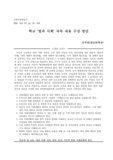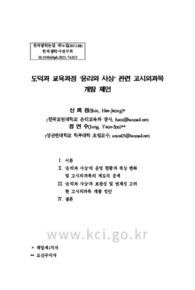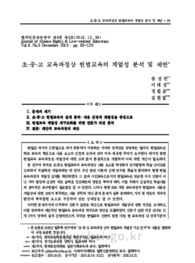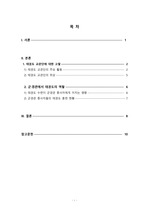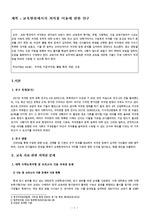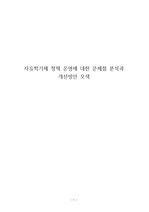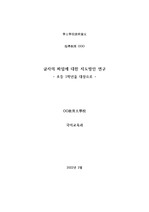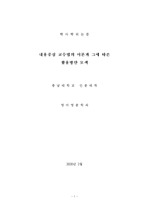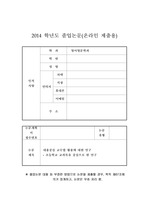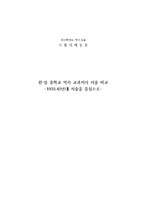

-
 * 본 문서는 배포용으로 복사 및 편집이 불가합니다.
* 본 문서는 배포용으로 복사 및 편집이 불가합니다.
미리보기
서지정보
· 발행기관 : 한국사회교과교육학회
· 수록지 정보 : 사회과교육연구 / 12권 / 2호
· 저자명 : 조우영
목차
Ⅰ. 머리말
Ⅱ. 기존의 교육 내용 범위 선정 비판
Ⅲ. 기존의 교육 내용 순서 배열 비판
Ⅳ. 대안 제시
Ⅴ. 맺음말
초록
지금의 고등학교 ‘법과 사회’ 과목은 크게 ‘법의 이념과 권리, 의무’(법에 대한 일반적․총론적
이해), ‘개인 생활과 법’(사법), ‘사회 생활과 법’(사회법), ‘국가 생활과 법’(공법), ‘법 생활의 발전
과 과제’라는 다섯 개의 영역으로 구분되어 그 순서대로 배열되어 있으며, 대체로 이른바 ‘규범학
적 접근’과 ‘가치 주입’으로 일관하고 있다. 거기서 가운데 세 개의 영역은 법학계의 일반적 관행
에 따라 구분되고 이른바 ‘환경확대법’에 따라 배열된 것으로 보이는데, 영역 구분과 배열 순서
모두 고등학교에서의 법 교육에 마땅하지 않다. 영역 구분에서의 핵심적인 문제점은 이질적인 성
격을 띠는 여러 ‘공법’들을 통째로 한 군데에 묶어놓은 것이며, 순서 배열에서의 핵심적인 문제점
은 교육의 소재인 우리나라의 현행 법체계 자체의 논리적 구조(전체 법질서는 ‘헌법’을 출발점으
로 삼아 그에 따라 짜여져 있고, 사회법은 공법과 사법의 존재를 전제로 해서 그 교차점을 이루
고 있음)를 무시하고 있다는 점이다. 내용 요소들에 대한 규범학적 접근과 가치 주입도 민주 사
회에서의 시민 교육에 적합하지 않으며, 사회과학적이고 비판적인 접근 방향을 잡아야 마땅하다.
이와 같은 생각을 바탕으로, 다음과 같은 대단원 구분과 배열 및 접근 방향에 따라 ‘법과 사회’
과목의 내용을 구성할 것을 제안한다(본문에 소단원까지 구분된 구체적인 방안 있음).
1. 사회생활과 법의 일반적 관계 및 법의 일반적 속성을 이해하도록 한다.
2. 우리나라 현행 법체계의 역사적․사회적․이데올로기적 형성 배경을 이해하도록 한다.
3. 우리나라 현행 법체계의 큰 짜임새를 이해하도록 한다.
4. 우리나라 헌정 질서 및 헌법의 주요 내용과 원리를 이해하도록 한다.
5. 일상적 국내 사회생활의 내용과 성격을 분야나 측면을 나누어가면서 이해하고 그에 대한
법의 규율 내용과 원리를 이해하도록 한다.
6. 국내 사회생활에서 일어날 수 있는 분쟁 상황 및 그에 대한 법적 처리의 절차와 원리를
분야별로 나누어 이해하도록 한다.
7. 국내 사회생활에 대한 법적 규율의 한계를 이해하고 오늘날 우리나라 법 문화와 법체계의
문제점을 짚어 비판해보도록 한다.
8. 국제 사회의 특징적 면모와 국제법의 대략적 내용 및 우리나라의 국제적 위상과 국제법적
구속 내용을 이해하도록 한다.
9. 현재와 미래의 새로운 사회 변화의 내용과 방향 및 그에 대응하는 법의 변화 내용과 방향
을 이해하고 예측해보도록 한다.
영어초록
In the Seventh National Curriculum of South Korea(1997∼), the contents of law-related
education for high school students under the subject title of 'Law and Society' are divided
into five parts, i. e. 'The Ideas of Law / Legal Rights and Obligations'(general
understanding of law), 'Private Life and Law'(private laws), 'Social Life and Law'(social
laws), 'National Life and Law'(public laws), and 'The Development and the Problems of
Legal Life', and those are arranged in such order. The division and arrangement of the
intermediate three parts seem to have followed a general practice among jurists and the
so-called 'Expanding Environments'. Such a division and arrangement is not suitable for
coherent and integrative understanding of current South Korean legal system, because
diverse public laws are quite heterogeneous and the social laws cannot be properly
understood without an understanding of the private and the public laws. Above all, the
present South Korean legal system is a 'constitutional' one which is organised after a
written constitution. Therefore, the Constitution must be arranged before any other positive
laws. On the other hand, the Curriculum approaches the law along a dogmatic way and
lays some emphasis on the cramming of values. As such an approach is not desirable for
democratic civil education, so it should be changed into a social-scientific and critical one.
Conclusively, I propose an alternative organization of contents with following scope,
sequence and approach(The details are proposed in the body of this article.):
1. Understanding the relation between social life and law, and some general natures
of law.
2. Understanding historical, social, and ideological backgrounds of the present South
Korean legal system.
3. Understanding hierarchial structure and substantial framework of the present South
Korean legal system.
4. Understanding main contents and principles of current South Korean Constitution.
5. Understanding the structure and nature of peaceful-and-ordered domestic life, and
some main contents and principles of relevant laws(administrative laws, private
laws, and social laws).
6. Understanding the structure and nature of domestic disputes, and some main
contents and principles of relevant laws(procedural laws).
7. Understanding the limits of ruling domestic life with laws, and Criticising the
present South Korean legal system and law-related culture.
8. Understanding the structure and nature of international community and some main
contents and principles of international laws focused on the problems relevant to
South Korea.
9. Understanding and Forecasting current and future change of human life and
relevant laws.참고자료
· 없음태그
-
자료후기
Ai 리뷰지식판매자의 자료는 깊이 있는 분석과 명확한 설명이 잘 어우러져 있어 학습에 많은 도움이 되었습니다. 과제 작성 시 유용하게 활용할 수 있었습니다. -
자주묻는질문의 답변을 확인해 주세요

꼭 알아주세요
-
본 학술논문은 (주)학지사와 각 학회간에 저작권계약이 체결된 것으로 AgentSoft가 제공 하고 있습니다.
본 저작물을 불법적으로 이용시는 법적인 제재가 가해질 수 있습니다. -
해피캠퍼스는 구매자와 판매자 모두가 만족하는 서비스가 되도록 노력하고 있으며, 아래의 4가지 자료환불 조건을 꼭 확인해주시기 바랍니다.
파일오류 중복자료 저작권 없음 설명과 실제 내용 불일치 파일의 다운로드가 제대로 되지 않거나 파일형식에 맞는 프로그램으로 정상 작동하지 않는 경우 다른 자료와 70% 이상 내용이 일치하는 경우 (중복임을 확인할 수 있는 근거 필요함) 인터넷의 다른 사이트, 연구기관, 학교, 서적 등의 자료를 도용한 경우 자료의 설명과 실제 자료의 내용이 일치하지 않는 경우
“사회과교육연구”의 다른 논문도 확인해 보세요!
-
협력적 사회과 수업실습 프로그램의 개발과 적용을 위한 실행 연구 : 교생의 반성적 수업실천을 사례로 30 페이지
이 연구는 협력적 사회과 수업실습 프로그램을 개발하고 교육대학교 수업실습에 적용하여 그 의미를 논의하였다. 교생이 교육실습 동안에 반성적인 사회과 수업실천이 가능하도록 교육대학교 와 학교현장 간의 협력 체제를 구축하였다. 반성의 구체적인 내용은 교생이 직면한 수업딜레마의 해소에 초점이 있었고, 학습자간의 상호작용 부족 문제를 딜레마로 규정하였다. 협력.. -
학교에서의 표현의 자유와 한계 22 페이지
학교에서 표현의 자유의 보장 범위와 정도에 대하여 한국, 일본, 미국의 표현의 자유와 관련된 판례를 고찰하였다. 특히 미국의 표현의 자유와 관련된 주요한 판례 고찰을 통하여 우리 학교교 육의 표현의 자유 보호 범위에 대한 시사점을 얻고자 하였다. 학교에서 표현의 자유는 당연히 얻 어지는 것이 아니라 자유를 얻기 위한 투쟁과 노력의 결과로 보장될 수 있.. -
학교경제교육내용 표준안에 대한 전문가 델파이 조사 : 지식영역을 중심으로 26 페이지
본 논문은 초․중․고등학교 사회과에서 이루어지는 경제교육의 내용기준안을 마련하기 위한 작업의 일환으로 경제교육연구팀에서 개발한 ‘학교경제교육의 내용체계(안)’의 타당도와 객관성을 높이기 위해 실시된 전문가 델파이 조사의 조사결과 및 분석결과를 보고하는 데 그 목적이 있다. 본 델파이 조사를 통해 밝혀진 주요 내용과 시사점은 다음과.. -
초등학교 사회과 수업 풍토에 대한 연구 : Newmann의 교실사려도(Classroom thoughtfulness)를 중심으로 17 페이지
본 연구의 목적은 초등학교 사회과 수업과정에 교실사려도가 어떤 양상으로 나타나는가를 살펴 보는데 있다. 이를 위해 크게 두 가지 방법으로 연구를 진행했다. 먼저 Newmann의 교실사려도 지표를 초등학교에 맞는 설문지로 개발하여 학생들과 교사를 대상으로 항목별, 학교별, 학급별로 지각(知覺)하는 양상을 조사하였다. 둘째, Onosko의 고급사고력 향상.. -
초등교사의 사회과 경제 수업 이미지에 대한 사례연구 23 페이지
본 연구는 초등 교사의 사회과 수업 실천을 이해하고자 한 질적 사례연구이다. 사회과 수업 은 하나의 목표를 달성하기 위한 수단으로 존재하는 것이 아니라 교육목적과 교육내용에 대 한 교사의 가치와 판단이 동시에 표현된 총체적 활동이다. 논자는 사례교사의 사회과 경제 영 역의 수업을 관찰하고 그 현상을 이미지와 원리로 표현하고자 하였다. 수업참관 및 대..
찾으시던 자료가 아닌가요?
지금 보는 자료와 연관되어 있어요!
문서 초안을 생성해주는 EasyAI
